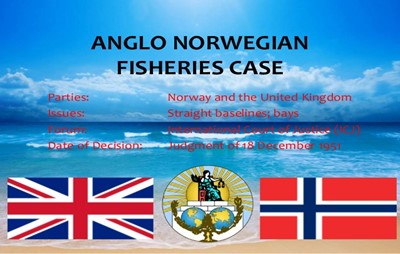Full Case Name – United Kingdom V Norway
Court Name – International Court of Justice
Citation – [1951] ICJ 3
Perhaps the most important function of international law is to determine which bits of Earth and sea belong to which countries. A nation is defined by the extent of its territory and over human history. Many wars have been fought over the specific location of borders. In this Anglo Norwegian Fisheries Case, there was a dispute between the United Kingdom and Norway about Norway’s maritime border in the North Sea.
The Anglo-Norwegian Fisheries Case, also known as the Fisheries Case is a landmark case in the history of international law and it deals with the issue of fishing rights in the North Sea. The case was brought before the International Court of Justice (ICJ) in 1951 by the United Kingdom, challenging Norway’s jurisdiction over fisheries in the area.
Facts of the Anglo Norwegian Fisheries Case
British fishing ships had been fishing in waters that Norway claimed as her own. Norway claimed all the waters within four nautical miles from its baseline. Britain agreed that this was appropriate. Normally the baseline is the low-watermark which is the shoreline at low tide. Norway, however, was a bit different just off the coast running up and down the coast where a series of hundreds of rocky outcrops like little islands in a geographic sense though these were really connected to the mainland. Norway for hundreds of years had counted these rocky outcrops as part of its mainland territory.

So as far as Norway was concerned, the bass line was not the low tide mark on the beach instead the bass line was the outer line of these rocky outcrops.
The customary rule was no British ship would enter 10 miles from the coastal line of Norway. Britain respected this for 300 years. But in 1911, one British traveler ship entered this line and Norway seized the ship. In 1948, another British fishing vessel entered that line and the Norwegian Government again captured the ship and arrested everyone on that ship. After that, the United Kingdom approached ICJ.
Issue in the Case
The main issue in the Anglo-Norwegian Fisheries Case was the conflicting claims of jurisdiction over fisheries in the North Sea between the United Kingdom and Norway. Norway claimed exclusive jurisdiction over the fishery zone beyond its territorial sea, while the United Kingdom claimed historic fishing rights in the area, dating back to medieval times.
The main issues in the fisheries case were
- Whether the coastal line delimited by Norway which is 10 miles according to customary rule is right or wrong?
- Whether Norway is responsible for arresting the British people and whether Norway should pay compensation or not?
Rule of Law
The rule of law in the Anglo-Norwegian Fisheries Case was based on several principles of international law.
- The case was decided based on the principle of the natural prolongation of the continental shelf, which allowed coastal states to exercise jurisdiction over the resources on their continental shelves. The Court held that Norway had jurisdiction over the fisheries beyond its territorial sea, up to twelve nautical miles from the coastline, based on this principle. This principle has become a cornerstone of modern maritime law and has been incorporated into the United Nations Convention on the Law of the Sea.
- The case reaffirmed the importance of interpreting historic rights in light of contemporary international law. The United Kingdom had claimed historic fishing rights in the area, dating back to medieval times. However, the Court held that these historic rights did not confer exclusive fishing rights in the disputed area, and must be interpreted in light of contemporary international law.
- The Court’s decision on the role of customary international law in the case had significant implications for the law of the sea. It affirmed the importance of interpreting customary law in light of contemporary international law, which reflects the evolving nature of customary international law. This approach has been applied in subsequent cases, such as the Nicaragua Case, which held that customary international law can be modified through state practice and opinio juris.
Overall, the rule of law in the Anglo-Norwegian Fisheries Case was based on the principles of the natural prolongation of the continental shelf, the interpretation of historic rights in light of contemporary international law, and the evolving nature of customary international law.
Analysis of The Case
United Kingdom had 2 contentions in this case.
The first one was, Norway needs to delimit the maritime boundary in the low water grounds. According to this, the maritime boundary would be 4 miles and not 10 miles.
The second one was, as Norway seized the fishing vessel and arrested the British people, Norway needs to compensate for this action.
Norway argued on the history of 300 years of customary rule and the delimitation method was consistent with general principles of international law.
ICJ’s Decision
There are a number of ways that international law can be developed. The most obvious way is by nations making treaties and conventions. Another way is customary law. Customary law reflects the ways that nations dealt with one another before we had a more formal system of international law. The court found that Norway had used the rocky outcrops as its baseline for centuries and that other nations including Great Britain had allowed them to do so. The court said, historical data produced by the Norwegian government lends some weight to the idea of the survival of traditional rights over fishing grounds. Such rights founded on the vital need of the population and attested by very ancient and peaceful usage may legitimately be taken into account in drawing a line whichever appears to the court to have been kept within the bounds of what is moderate and reasonable. Norway was therefore allowed in accordance with customary international law to calculate its territorial waters from the edge of the rock outcrops.
Court also considered the 300 years of practice of customary law. The United Kingdom never objected to it in 300 years.
After considering all these, the court ruled in the favour of Norway.
Conclusion
Overall, the Anglo-Norwegian Fisheries Case was a landmark decision in the development of international law and had significant implications for the rights and responsibilities of coastal states in the management and conservation of marine resources.
- What is Mens Rea and Actus Reus - February 13, 2024
- Case Summary of Anglo Norwegian Fisheries Case | United Kingdom V Norway - April 7, 2023
- What is a Solicitor? How to Become One - January 9, 2023

